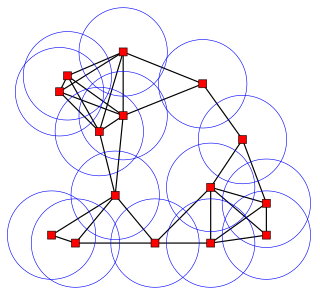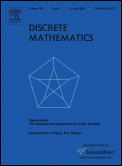
Discrete geometry and combinatorial geometry are branches of geometry that study combinatorial properties and constructive methods of discrete geometric objects. Most questions in discrete geometry involve finite or discrete sets of basic geometric objects, such as points, lines, planes, circles, spheres, polygons, and so forth. The subject focuses on the combinatorial properties of these objects, such as how they intersect one another, or how they may be arranged to cover a larger object.

In graph theory, the Erdős–Faber–Lovász conjecture is a problem about graph coloring, named after Paul Erdős, Vance Faber, and László Lovász, who formulated it in 1972. It says:
The Fulkerson Prize for outstanding papers in the area of discrete mathematics is sponsored jointly by the Mathematical Optimization Society (MOS) and the American Mathematical Society (AMS). Up to three awards of $1,500 each are presented at each (triennial) International Symposium of the MOS. Originally, the prizes were paid out of a memorial fund administered by the AMS that was established by friends of the late Delbert Ray Fulkerson to encourage mathematical excellence in the fields of research exemplified by his work. The prizes are now funded by an endowment administered by MPS.

László Lovász is a Hungarian mathematician and professor emeritus at Eötvös Loránd University, best known for his work in combinatorics, for which he was awarded the 2021 Abel Prize jointly with Avi Wigderson. He was the president of the International Mathematical Union from 2007 to 2010 and the president of the Hungarian Academy of Sciences from 2014 to 2020.
In probability theory, if a large number of events are all independent of one another and each has probability less than 1, then there is a positive probability that none of the events will occur. The Lovász local lemma allows one to relax the independence condition slightly: As long as the events are "mostly" independent from one another and aren't individually too likely, then there will still be a positive probability that none of them occurs. It is most commonly used in the probabilistic method, in particular to give existence proofs.

Proofs from THE BOOK is a book of mathematical proofs by Martin Aigner and Günter M. Ziegler. The book is dedicated to the mathematician Paul Erdős, who often referred to "The Book" in which God keeps the most elegant proof of each mathematical theorem. During a lecture in 1985, Erdős said, "You don't have to believe in God, but you should believe in The Book."
Arjen Klaas Lenstra is a Dutch mathematician, cryptographer and computational number theorist. He is currently a professor at the École Polytechnique Fédérale de Lausanne (EPFL) where he heads of the Laboratory for Cryptologic Algorithms.
The Journal of Combinatorial Theory, Series A and Series B, are mathematical journals specializing in combinatorics and related areas. They are published by Elsevier. Series A is concerned primarily with structures, designs, and applications of combinatorics. Series B is concerned primarily with graph and matroid theory. The two series are two of the leading journals in the field and are widely known as JCTA and JCTB.
The mathematical discipline of topological combinatorics is the application of topological and algebro-topological methods to solving problems in combinatorics.

Discrete Mathematics is a biweekly peer-reviewed scientific journal in the broad area of discrete mathematics, combinatorics, graph theory, and their applications. It was established in 1971 and is published by North-Holland Publishing Company. It publishes both short notes, full length contributions, as well as survey articles. In addition, the journal publishes a number of special issues each year dedicated to a particular topic. Although originally it published articles in French and German, it now allows only English language articles. The editor-in-chief is Douglas West.
Combinatorica is an international journal of mathematics, publishing papers in the fields of combinatorics and computer science. It started in 1981, with László Babai and László Lovász as the editors-in-chief with Paul Erdős as honorary editor-in-chief. The current editors-in-chief are Imre Bárány and József Solymosi. The advisory board consists of Ronald Graham, Gyula O. H. Katona, Miklós Simonovits, Vera Sós, and Endre Szemerédi. It is published by the János Bolyai Mathematical Society and Springer Verlag.

Gábor Tardos is a Hungarian mathematician, currently a professor at Central European University and previously a Canada Research Chair at Simon Fraser University. He works mainly in combinatorics and computer science. He is the younger brother of Éva Tardos.

Imre Bárány is a Hungarian mathematician, working in combinatorics and discrete geometry. He works at the Rényi Mathematical Institute of the Hungarian Academy of Sciences, and has a part-time appointment at University College London.
László Pyber is a Hungarian mathematician. He is a researcher at the Alfréd Rényi Institute of Mathematics, Budapest. He works in combinatorics and group theory.
György Elekes was a Hungarian mathematician and computer scientist who specialized in Combinatorial geometry and Combinatorial set theory. He may be best known for his work in the field that would eventually be called Additive Combinatorics. Particularly notable was his "ingenious" application of the Szemerédi–Trotter theorem to improve the best known lower bound for the sum-product problem. He also proved that any polynomial-time algorithm approximating the volume of convex bodies must have a multiplicative error, and the error grows exponentially on the dimension. With Micha Sharir he set up a framework which eventually led Guth and Katz to the solution of the Erdős distinct distances problem.
Miklós Simonovits (4 September 1943 in Budapest) is a Hungarian mathematician who currently works at the Rényi Institute of Mathematics in Budapest and is a member of the Hungarian Academy of Sciences. He is on the advisory board of the journal Combinatorica. He is best known for his work in extremal graph theory and was awarded Széchenyi Prize in 2014. Among other things, he discovered the method of progressive induction which he used to describe graphs which do not contain a predetermined graph and the number of edges is close to maximal. With Lovász, he gave a randomized algorithm using O(n7 log2n) separation calls to approximate the volume of a convex body within a fixed relative error.

Katalin Marton was a Hungarian mathematician, born in Budapest.

In graph theory, the Lovász–Woodall conjecture is a long-standing problem on cycles in graphs. It says:
This page is based on this
Wikipedia article Text is available under the
CC BY-SA 4.0 license; additional terms may apply.
Images, videos and audio are available under their respective licenses.








